World
India and Japan Forge Stronger Ties Amid US Trade Pressures

India is reinforcing its diplomatic relationships with Japan and China as part of a strategic response to increasing pressures from the United States on trade and energy policies. Prime Minister Narendra Modi recently concluded a successful visit to Japan, where discussions focused on enhancing trade and strategic partnerships. This visit is a key step toward bolstering economic collaboration and reflects India’s intent to strengthen ties with essential global partners.
During his visit, which occurred on August 30, 2025, Modi and Japanese Prime Minister Shigeru Ishiba outlined plans for a deepened strategic partnership across eight critical sectors. These sectors include economic cooperation, security, technology, and health, among others. The two leaders set ambitious goals, with reports suggesting potential private investments worth 10 trillion yen (approximately ₹5.99 lakh crore) flowing into India over the next decade.
Modi’s upcoming trip to China further highlights India’s commitment to fostering bilateral ties. He is scheduled to arrive in Tianjin for the Shanghai Cooperation Organization (SCO) Summit, where he will meet with Chinese President Xi Jinping. This visit marks Modi’s first trip to China since the Galwan clash, and discussions are anticipated to focus on confidence-building measures, including the resumption of air services.
The backdrop of Modi’s diplomatic efforts includes ongoing discussions with Russian President Vladimir Putin, where India’s oil imports from Russia are likely to be a significant point of discussion. This underscores India’s balancing act of maintaining strong relationships with multiple countries amid external pressures.
During the 15th India-Japan Annual Summit, Modi received a warm welcome in Tokyo, marked by traditional Japanese performances and cultural showcases from the Indian diaspora. Over his two-day visit, he toured several factories, including the prototype manufacturing plant for the E-10 Shinkansen bullet train, which India plans to procure.
A notable aspect of the India-Japan partnership is the launch of an action plan to facilitate the exchange of 500,000 workers over the next five years. Japan has committed to issuing visas to 50,000 Indian skilled professionals across various sectors, reflecting a significant step in workforce collaboration.
In addition to economic cooperation, a security cooperation framework was established to address global security challenges collectively. Japan’s space agency, JAXA, will collaborate with the Indian Space Research Organisation (ISRO) on the upcoming Chandrayaan-5 mission, which aims to advance research on the lunar surface and environment.
The developments in India’s foreign relations come as the nation seeks to identify new markets amid the ongoing trade war with the United States. Analysts interpret Modi’s diplomatic engagements as a strategic initiative to forge a new economic bloc in Asia, aligning with both Japan and China while assuring Japanese leaders that closer ties with China will not compromise the integrity of the Quad alliance, which includes the United States and Australia.
As India navigates these complex international dynamics, the outcomes of Modi’s recent and upcoming visits could have significant implications for regional cooperation and economic stability in the years to come.
-

 World5 months ago
World5 months agoSBI Announces QIP Floor Price at ₹811.05 Per Share
-

 Lifestyle5 months ago
Lifestyle5 months agoCept Unveils ₹3.1 Crore Urban Mobility Plan for Sustainable Growth
-

 Science4 months ago
Science4 months agoNew Blood Group Discovered in South Indian Woman at Rotary Centre
-

 World5 months ago
World5 months agoTorrential Rains Cause Flash Flooding in New York and New Jersey
-

 Top Stories5 months ago
Top Stories5 months agoKonkani Cultural Organisation to Host Pearl Jubilee in Abu Dhabi
-

 Sports4 months ago
Sports4 months agoBroad Advocates for Bowling Change Ahead of Final Test Against India
-

 Science5 months ago
Science5 months agoNothing Headphone 1 Review: A Bold Contender in Audio Design
-

 Top Stories5 months ago
Top Stories5 months agoAir India Crash Investigation Highlights Boeing Fuel Switch Concerns
-

 Business5 months ago
Business5 months agoIndian Stock Market Rebounds: Sensex and Nifty Rise After Four-Day Decline
-

 Sports4 months ago
Sports4 months agoCristian Totti Retires at 19: Pressure of Fame Takes Toll
-

 Politics5 months ago
Politics5 months agoAbandoned Doberman Finds New Home After Journey to Prague
-

 Top Stories5 months ago
Top Stories5 months agoPatna Bank Manager Abhishek Varun Found Dead in Well









